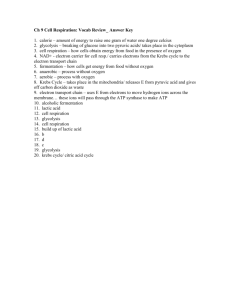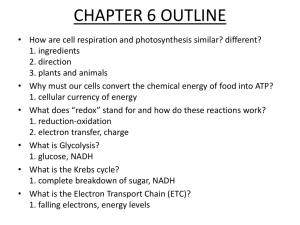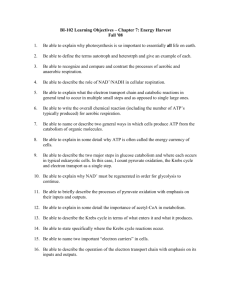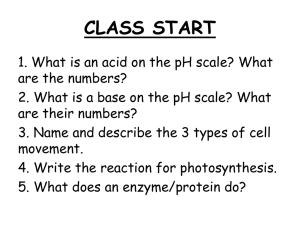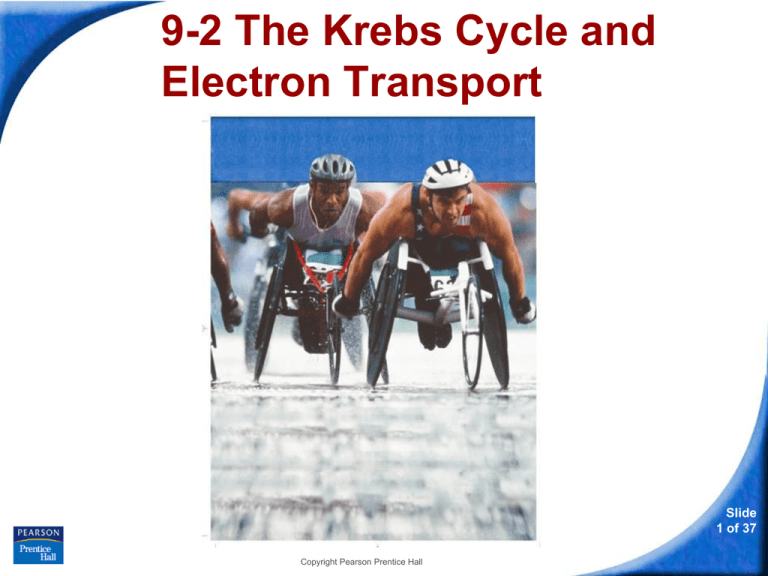
9-2 The Krebs Cycle and
Electron Transport
Slide
1 of 37
Copyright Pearson Prentice Hall
9-2 The Krebs Cycle and
Electron Transport
9-2 The Krebs Cycle and
Electron Transport
Oxygen is required for the final steps of cellular
respiration.
Because the pathways of cellular respiration
require oxygen, they are aerobic.
Slide
2 of 37
Copyright Pearson Prentice Hall
9-2 The Krebs Cycle and
Electron Transport
The Krebs Cycle
The Krebs Cycle
In the presence of oxygen, pyruvic acid produced
in glycolysis passes to the second stage of cellular
respiration, the Krebs cycle.
Slide
3 of 37
Copyright Pearson Prentice Hall
9-2 The Krebs Cycle and
Electron Transport
The Krebs Cycle
During the Krebs cycle, pyruvic acid is
broken down into carbon dioxide in a
series of energy-extracting reactions.
Slide
4 of 37
Copyright Pearson Prentice Hall
9-2 The Krebs Cycle and
Electron Transport
The Krebs Cycle
The Krebs cycle
begins when pyruvic
acid produced by
glycolysis enters the
mitochondrion.
Slide
5 of 37
Copyright Pearson Prentice Hall
9-2 The Krebs Cycle and
Electron Transport
The Krebs Cycle
One carbon molecule
is removed, forming
CO2, and electrons
are removed,
changing NAD+ to
NADH. The enzyme
pyruvate
dehydrogenase joins
in to move the
process along.
Slide
6 of 37
Copyright Pearson Prentice Hall
9-2 The Krebs Cycle and
Electron Transport
The Krebs Cycle
Coenzyme A joins
the 2-carbon
molecule, forming
acetyl-CoA.
Slide
7 of 37
Copyright Pearson Prentice Hall
9-2 The Krebs Cycle and
Electron Transport
The Krebs Cycle
Acetyl-CoA then
adds the 2-carbon
acetyl group to
oxaloacetic acid and
uses the enzyme
citrate synthase to
form citric acid.
Citric acid
Slide
8 of 37
Copyright Pearson Prentice Hall
9-2 The Krebs Cycle and
Electron Transport
The Krebs Cycle
Citric acid is broken down using aconitase into
isocitric acid.
isocitric acid
Slide
9 of 37
Copyright Pearson Prentice Hall
9-2 The Krebs Cycle and
Electron Transport
The Krebs Cycle
Another molecule of CO2 is released using
isocitrate dehydrogenase and electrons join NAD+
forming α-ketoglutaric acid.
Isocitric acid
α-ketoglutaric acid
Slide
10 of 37
Copyright Pearson Prentice Hall
9-2 The Krebs Cycle and
Electron Transport
The Krebs Cycle
Two enzymes, α-KG dehydrogenase and succinyl-CoA synthase, are
used to produce one molecule of ATP and NADH in the production of
succinic acid. This releases another molecule of CO2 and one
molecule of H2O moves into the system.
Isocitric acid
α-ketoglutaric acid
Succinic acid
H2O
Slide
11 of 37
Copyright Pearson Prentice Hall
9-2 The Krebs Cycle and
Electron Transport
The Krebs Cycle
Then succinyl dehydrogenase is going to add two electrons
back in to change FAD to FADH2 and produce fumaric acid.
Isocitric acid
α-ketoglutaric acid
Fumaric acid
Succinic acid
H2O
Slide
12 of 37
Copyright Pearson Prentice Hall
9-2 The Krebs Cycle and
Electron Transport
The Krebs Cycle
Another molecule of water is going to be brought back into the
system and fumarase is going to produce malic acid.
Isocitric acid
α-ketoglutaric acid
Malic acid
Fumaric acid
H2O
Succinic acid
H2O
Slide
13 of 37
Copyright Pearson Prentice Hall
9-2 The Krebs Cycle and
Electron Transport
The Krebs Cycle
Electrons are removed one more time from NAD+ to NADH in combination
with malic dehydrogenase to form oxaloacetic acid. This is the acid that
will combine with Acetyl-CoA to start the process all over again.
Isocitric acid
Oxaloacetic
acid
α-ketoglutaric acid
Malic acid
Fumaric acid
H2O
Succinic acid
H2O
Slide
14 of 37
Copyright Pearson Prentice Hall
9-2 The Krebs Cycle and
Electron Transport
The Krebs Cycle
The energy tally from 1 molecule of pyruvic acid is
•
•
•
4 NADH
1 FADH2
1 ATP
Slide
15 of 37
Copyright Pearson Prentice Hall
9-2 The Krebs Cycle and
Electron Transport
The Krebs Cycle
What does the cell do with all those high-energy
electrons in carriers like NADH?
In the presence of oxygen, those high-energy
electrons can be used to generate huge amounts
of ATP in the Electron Transport Chain.
Slide
16 of 37
Copyright Pearson Prentice Hall
9-2 The Krebs Cycle and
Electron Transport
Electron Transport
Electron Transport
The electron transport chain uses the highenergy electrons from the Krebs cycle to
convert ADP into ATP.
Slide
17 of 37
Copyright Pearson Prentice Hall
9-2 The Krebs Cycle and
Electron Transport
Electron Transport
High-energy electrons from NADH and FADH2 are
passed along the electron transport chain from one
carrier protein to the next.
Slide
18 of 37
Copyright Pearson Prentice Hall
9-2 The Krebs Cycle and
Electron Transport
Electron Transport
At the end of the chain, an enzyme combines
these electrons with hydrogen ions and oxygen to
form water.
Slide
19 of 37
Copyright Pearson Prentice Hall
9-2 The Krebs Cycle and
Electron Transport
Electron Transport
As the final electron acceptor of the electron
transport chain, oxygen gets rid of the low-energy
electrons and hydrogen ions.
Slide
20 of 37
Copyright Pearson Prentice Hall
9-2 The Krebs Cycle and
Electron Transport
Electron Transport
When 2 high-energy electrons move down the
electron transport chain, their energy is used to
move hydrogen ions (H+) across the membrane.
Slide
21 of 37
Copyright Pearson Prentice Hall
9-2 The Krebs Cycle and
Electron Transport
Electron Transport
During electron transport, H+ ions build up in the
intermembrane space, so it is positively charged.
Slide
22 of 37
Copyright Pearson Prentice Hall
9-2 The Krebs Cycle and
Electron Transport
Electron Transport
The other side of the membrane, from which those
H+ ions are taken, is now negatively charged.
Slide
23 of 37
Copyright Pearson Prentice Hall
9-2 The Krebs Cycle and
Electron Transport
Electron Transport
The inner membranes of the mitochondria contain
protein spheres called ATP synthases.
ATP
synthase
Slide
24 of 37
Copyright Pearson Prentice Hall
9-2 The Krebs Cycle and
Electron Transport
Electron Transport
As H+ ions escape through channels into these
proteins, the ATP synthase spins.
Channel
ATP
synthase
Slide
25 of 37
Copyright Pearson Prentice Hall
9-2 The Krebs Cycle and
Electron Transport
Electron Transport
As it rotates, the enzyme grabs a low-energy ADP,
attaching a phosphate, forming high-energy ATP.
Channel
ATP
synthase
ATP
Slide
26 of 37
Copyright Pearson Prentice Hall
9-2 The Krebs Cycle and
Electron Transport
Electron Transport
On average, each pair of high-energy electrons
that moves down the electron transport chain
provides enough energy to produce three
molecules of ATP from ADP.
Slide
27 of 37
Copyright Pearson Prentice Hall
9-2 The Krebs Cycle and
Electron Transport
The Totals
The Totals
Glycolysis produces just 2 ATP molecules per
molecule of glucose.
The complete breakdown of glucose through
cellular respiration, including glycolysis, results in
the production of 36 molecules of ATP.
Slide
28 of 37
Copyright Pearson Prentice Hall
9-2 The Krebs Cycle and
Electron Transport
The Totals
Slide
29 of 37
Copyright Pearson Prentice Hall
9-2 The Krebs Cycle and
Electron Transport
Comparing Photosynthesis and
Cellular Respiration
Comparing Photosynthesis and Cellular
Respiration
The energy flows in photosynthesis and cellular
respiration take place in opposite directions.
Slide
30 of 37
Copyright Pearson Prentice Hall
9-2 The Krebs Cycle and
Electron Transport
Comparing Photosynthesis and
Cellular Respiration
On a global level, photosynthesis and cellular
respiration are also opposites.
• Photosynthesis removes carbon dioxide from
the atmosphere and cellular respiration puts it
back.
• Photosynthesis releases oxygen into the
atmosphere and cellular respiration uses that
oxygen to release energy from food.
Slide
31 of 37
Copyright Pearson Prentice Hall

